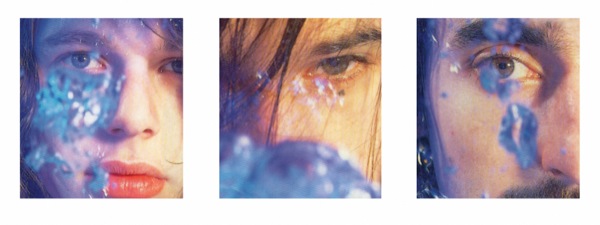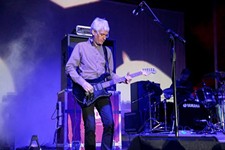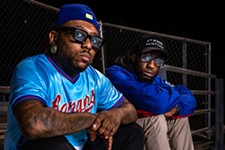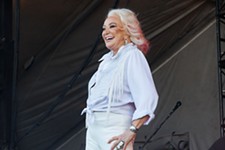A Gilded Eternity: The Return of Loop
Seminal UK outfit returns to U.S. expressly for Psych Fest
By Michael Toland, 11:00AM, Thu. May 1, 2014
Beginning in 1986, British troupe Loop evolved from a spacy garage band to a smoke-obscured, atmospheric monster that all but abandoned traditional songsmithery for tuneful stasis. A Gilded Eternity, the band’s 1990 masterpiece, remains a striking convergence of riff and drone that still influences mantra-minded musicians.

The group split in 1991, due to pressures from an industry hostile to uncompromising, exploratory sounds. Bandleader Robert Hampson abandoned the guitar in favor of electronic sound composition, both as Main and as a solo act. Fans believed his decades-long insistence that Loop would never reform. Then the Gilded lineup did just that.
We spoke to Hampson in his hotel room at the start of the band’s first U.S. tour in nearly a quarter of a century, a tour built around the group’s headline appearance at Austin Psych Fest on Sunday.
Austin Chronicle: Really looking forward to seeing Loop!
Robert Hampson: Cool. We’re really looking forward to it as well. I love Austin. I’ve been there many times. One of my oldest friends lives in Austin, so I’ve been there visiting on holiday, been to his wedding and all sorts of occasions. I know it really well, though I’ve heard recentlu that it’s really changing [chuckles].
AC: You virtually abandoned the guitar after Loop broke up. How does it feel to have that instrument strapped on you again?
RH: Actually pretty good. I’ve enjoyed it more than I anticipated. It was slightly difficult to come to terms with for a while, but it doesn’t take very long to fall back into old habits. So it’s okay. I’m really enjoying it. It’s not something I’m going to spend the rest of my life doing, but at the moment, it’s fun.
AC: Did you keep playing while you were doing Main and your solo stuff?
RH: Absolutely not, no. I sold all of my equipment. I sold all my guitars. Even at friends’ houses, they’d show me their new equipment or whatever and I just wasn’t interested. So I really did abandon it completely. It was good for the soul [laughs].
AC: You’ve said you felt Loop didn’t finish well. What do you mean by that?
RH: At the time there was a lot of pressure on us from various angles that we didn’t cope with very well. Unfortunately, there was a point where it just all collided, and Loop just imploded. It was ironically after the last U.S. tour that we did, which was in 1990. I came back from that and I’d just had enough. I didn’t want to be involved in it anymore. There was aspects of it that I’m still coming to terms with even now. There’s commercial aspects to it, and pressures that are put upon a band and especially someone who’s seen as the leading figure of a band that I don’t really deal with very well.
Hopefully my coping mechanism will be a lot better this time than it was last time, because I’m considerably older now, so I’m more mature. I can see the danger signs that I can avoid this time ’round. That was certainly part of the reason for trying to do it again and see where it went.
AC: At this point, Loop isn’t your career, so you can have more fun with it.
RH: Exactly! I think there’s less pressure in that respect. We’re not obliged to do anything we don’t want to do this time ’round. We don’t have any record company pressure or any sort of commitment to anything right now, except obviously turning up in the town and playing the show. That’s very simple to deal with. As long as the van works [laughs]!
AC: Loop started in the world of independent labels, but eventually signed to a larger label. At a time when people were concerned that if an indie band signed to a major it would get commercial and sanitized, y’all made your weirdest, most uncompromising and most boundary-pushing album for a major label. Was that a conscious decision, or is that just the way the music evolved?
RH: No, we would have made that record whether it was still on a very, very small label or whatever. It was just part of the artistic process of where I wanted it to go. And obviously what came after that was even more difficult.
We weren’t considering the aspect that we were on a major label in America. I think in a lot of respects we were very uncompromising in our entire career. We didn’t follow the rules exactly as people wanted us to. Which did in fact lead to some problems at times. There was underlying factors that created a lot of the problems in the latter part of our career, which was post A Gilded Eternity, and that’s where it all imploded.
AC: A Gilded Eternity is an amazing album that holds up really, really well.
RH: Well, thank you. It was a very difficult record at the time, even for the most hardcore of Loop fans. They didn’t know quite how to take it, and it took a long time for it to sink in, really. And by the time people really did begin to – it sounds patronizing to say “to understand it,” because I don’t mean it like that – come to grips with what was going on there, we were long gone.
But it’s been really great to play those old songs again, and a lot of people seem to be really enjoying it. Which is all you can ask for, really. We have a lot of new fans that never saw us before, so it’s all good at the moment.
AC: How did you get hooked up with Austin Psych Fest?
RH: The minute [Rob Fitzpatrick] found out we were reforming he e-mailed me almost immediately. There was some rumors going around, what with the Internet these days and because of the Godflesh thing, where I rejoined for one show [to play the band’s Pure album to which Hampson contributed]. I think everybody considered that something was coming. Which it kind of was, but I kept very tight-lipped about certain things. We were still very much in the planning stages of even considering doing anything, let alone actually making anything concrete. But he’d been in contact almost immediately as the announcement was made.
Obviously I was very aware of Austin Psych Fest, so I said, “Well, I don’t see any reason why we shouldn’t do it.” And we’ve pretty much based the entire year’s tour around this show, because that was the first legitimate offer we had to come back to the States after all this time. So we thought if there’s one person out there that wants it, hopefully we can build a tour around that, which is what we’re doing now.
AC: Seems like a natural match.
RH: Absolutely! We’re looking forward to it. Hopefully the weather will be good and everybody will have some fun.
AC: One of the things you said before about the reunion is that you couldn’t think of a good reason not to do it anymore.
RH: I was famous for saying “No.” It got to the point where I said “No” so often that people just went, “Ah, he’ll never do it.” But at the time it was very difficult to comprehend, to even think about it. I really had distanced myself so far from it.
But then more interesting things were being talked about. I think the first thing that really triggered me from about a year ago was that Mogwai were curating a really big festival in London and they wanted us play. And obviously I’d been hounded for years about actually reforming, and I’d always said “No,” regardless of the conditions. But it was after that All Tomorrow’s Parties said, “Well, listen, if you seriously did do it, would you curate an ATP festival?”
It was very weird, because the general interest had been amped up. After years of a constant request stream coming in it suddenly amplified. It just got to the point where I thought maybe I’m being too much of a stick in the mud, and maybe I should seriously think about reactivating it to see what happens. So it was very tentative to begin with. We’ve had a few trials and tribulations along the way.
Being in a band is very difficult. I don’t think people really appreciate how hard it is. It’s much, much easier to be a solo artist, it has to be said. All down the line, the ramifications of even the slightest thing going wrong with logistics really can hamper you. So it’s a lot to take on, but I’ve not been one to run away from challenges. So it’s been good.
Unfortunately we lost our drummer [John Wills] shortly after the original spate of 10 shows around ATP. We decided it was best that we didn’t carry on with that lineup, which is sad, because it does make life difficult, especially when the fans want to see original members. But sometimes you just gotta say life goes on. We found another drummer who’s equally fantastic [Wayne Maskell from UK psych rockers the Heads], and there’s still some really, really great energy in there.
After the initial stages of being very nervy and tentative, it’s now finding its feet again. I think that’s beginning to show onstage as well. There’s a tactile energy coming back from the songs now, which is much more like the old days.
So something of the old spirit has definitely returned, which is one of the most exciting aspects for me, to hold that again.
AC: There was a very rich environment in Great Britain in the Eighties for guitar bands in general, psychedelic bands in particular. Loop really stood out from that. Did you know at the time that you were part of something that was going to continue to influence generations to come? Or were you just carrying on?
RH: No, that would be very arrogant to think of that. But on the other side, I always knew that we were different from everything else that was going on. I mean, I don’t like labels and I don’t like pigeonholing bands and movements. I’ve never been a fan of that. Each individual band, for good or for bad, should be left to stand in its own space. Obviously some find a stronger foothold to stand on than others. It’s always very difficult for me to talk about a creative force like that, because you often come across as egotistical or arrogant.
So I refrain from saying much about it, because I’ve always been a great believer in letting things stand up for themselves. I’ve never felt it necessary, whether it’s Loop or solo material, to really talk about it. I hope people can appreciate it for what is, and take from it what they wish, and if they don’t like it, they can leave it alone. I’m not really interested in making everything seem to be competitive with other people. It’s always something that leaves a very bad taste in my mouth.
On the other side of the coin is that maybe those records that we made possibly have a greater standing now than they did back in the day. Maybe it’s possible that people are seeing more of the unique quality of them. Obviously A Gilded Eternity is my case in point with that. Even a lot of Loop fans just didn’t get that record at the time.
But who knows? I’ve always been a great believer in that once it’s left the factory I have nothing else to do with it. It’s a moment of time, a piece of history in either people’s lives or even in the bandmembers’ lives. You can’t change it, you can’t tweak it. There’s nothing you can do about it, so you just have to let it exist in its own right.
AC: You went on to collaborate with Godflesh. Probably not what your fans were expecting.
RH: No, not at all. But especially in Europe and the UK at that time, there was very much a crossover, which is still evident today, of Loop and Godflesh. I think, even though we were quite different bands, we did exist in quite similar territories in many ways. Maybe the way that we did things and our attitudes and stuff, to the point that we’re actually going to be touring again in the UK for four or five shows because we used to tour a lot together back in the day.
I like the fact that they were very different bands, but they somehow clicked being on the same bill. There was something about it in my mind that was always really interesting. We came from different areas, but at the same time it was a really nice blend. Hopefully that’ll work again.
AC: You also said, when you talked about reforming Loop, that you wanted to make sure that the chapter is properly concluded. Do you feel like that’s happening with this tour, or has rejoining the old firm reinvigorated your interest in maybe making Loop music again?
RH: I’m not sure about that. I’m firmly sitting on the fence on that right now. I think it’s too early to say too much. I think we just have to see how it goes. We’ve only played about 13 shows together so far. It’s still very early days. But the energy is there, which I guess is the greatest contributing factor for other things to mature from that. We shall see [laughs].
AC: What’s in the near future for you? More Loop shows and more solo material?
RH: Right now, we’ve got 22 shows in the States. It’s a big tour, very long. Then we go back to Europe for like 10 days break, then we do some of the bigger festivals in Europe. We do a festival in Paris, we’re doing Primavera. And we’ve got the mini-Godflesh tour as well, the split tour. Then we have the big ATP Festival in Iceland, and there’s another, smaller festival in Poland, which will take us up to mid-July.
That’s it for the time being. Then I have a new solo album, which should’ve been finished in February, but I didn’t have time because obviously Loop took over so much. When I’ve gone back and had a little bit of a break, I’ll complete the solo album. Then... who knows?
A note to readers: Bold and uncensored, The Austin Chronicle has been Austin’s independent news source for over 40 years, expressing the community’s political and environmental concerns and supporting its active cultural scene. Now more than ever, we need your support to continue supplying Austin with independent, free press. If real news is important to you, please consider making a donation of $5, $10 or whatever you can afford, to help keep our journalism on stands.
Michael Toland, May 5, 2014
April 19, 2024
April 12, 2024
Loop, Robert Hampson, A Gilded Eternity, Godflesh, Mogwai, All Tomorrow’s Parties, Austin Psych Fest, the Main









